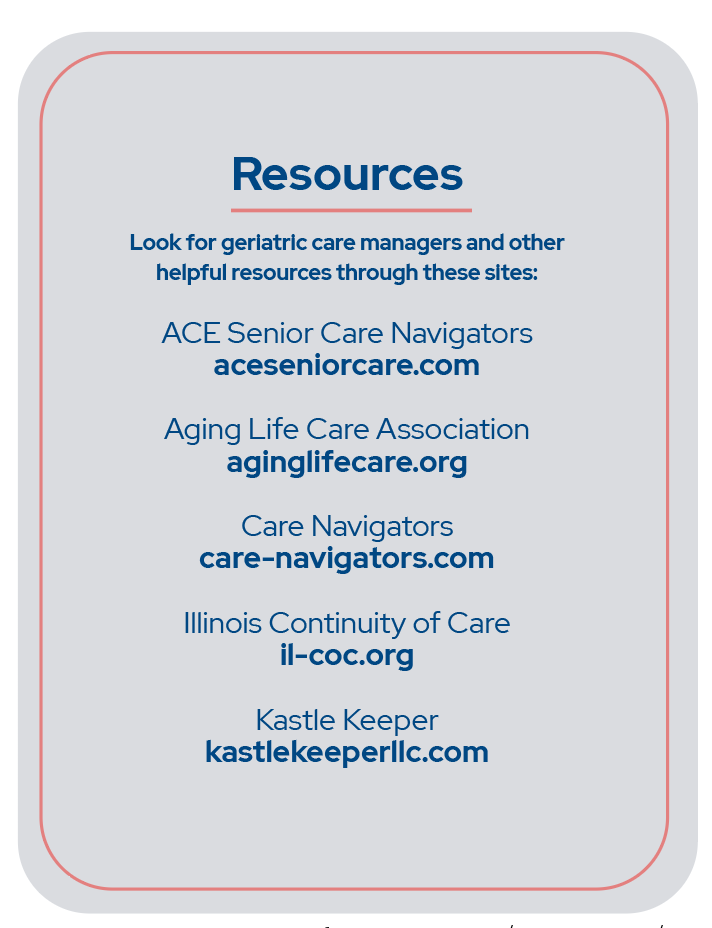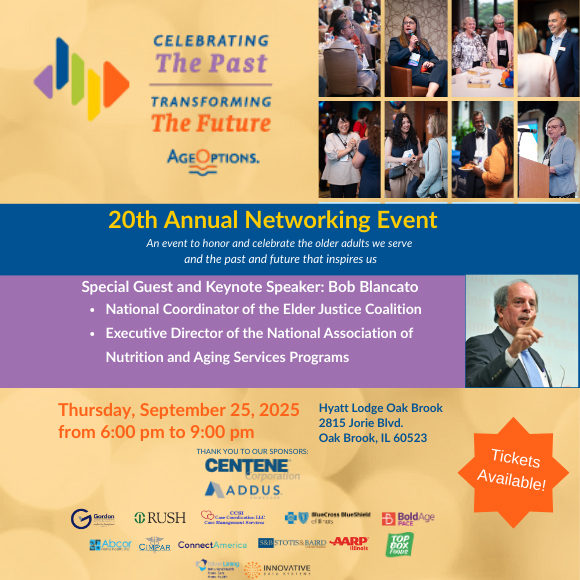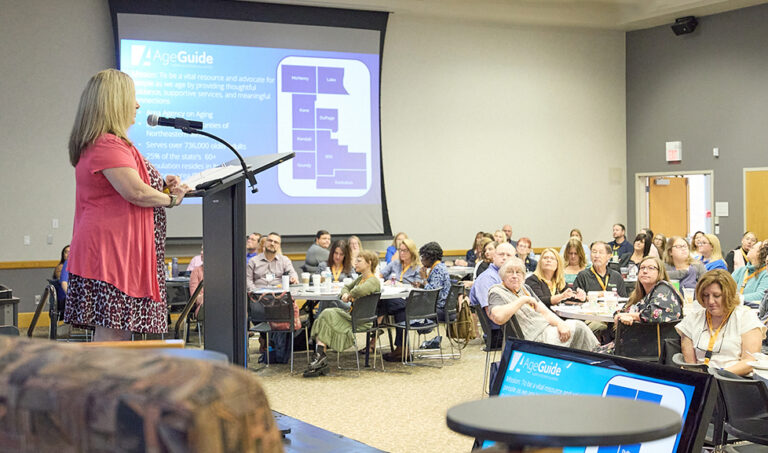Experts help families navigate tough situations
Betsy Calkins and her siblings recently faced a daunting situation. They noticed their mother, who at the time was in her 90s, was beginning to have challenges living alone in her Mount Prospect home. But with Calkins and two of her siblings living out of state, the responsibility to check on their mother fell to their brother, who lives in the Chicago suburbs, and a neighbor.
“Communication between the siblings was sometimes challenging, and we worried about our brother having to carry all of the responsibility,” Calkins says. “It was becoming clear that it wasn’t enough.”
After their mother fell at the grocery store, the siblings decided they needed more help overseeing her care. They wanted an expert who would help make sure their mother received the services and attention she needed, while also keeping the four siblings involved and informed.
Geriatric care managers assist families in coordinating care for their aging loved ones in a home or hospital setting. The managers may be licensed nurses, social workers, or gerontologists who assess an older adult’s situation and create a care plan to address their needs.
Think of a care manager as a personal care concierge — an independent expert who works for a family to help make decisions, rather than a professional who may represent a senior living community, home health agency, large healthcare system and its providers, or other vested interest.
By representing older adults and their families, geriatric care managers help family members navigate tough decisions and provide helpful resources to ensure the older adult is safe and cared for.
“Geriatric care managers are experts in the senior care landscape,” says Amy Cohen, owner of ACE Senior Care Navigators in Glenview. “They guide older adults and their families through experiences such as hospital discharges, home safety, and identifying the need for and procuring additional support and resources.”
Patient advocates are similar, but slightly different, professionals who help individuals of any age and act as liaisons between a patient and the healthcare system. Geriatric care managers, on the other hand, have a broader focus and can help with aspects of life that change as people get older, including finding senior housing or hiring home care aides.
Leading the lineup
Navigating care for an older loved one can overwhelm families, especially when family members live out of state or disagree on the level of care needed.
A care manager may be a good choice if a family recognizes there are issues with the health, safety, or daily functioning of their loved one. Jean Llamas, owner of Care Navigators Inc. and Care Guardians NFP in Algonquin, says geriatric care managers know the resources to handle those needs, saving families money and stress.
“They can save the client money by being the quarterback with housing placement, insurance navigation, locating entitled or free services, and ensuring all providers are coordinating care effectively and with clarity,” Llamas says.
Geriatric care managers also help families decipher the complex healthcare system and locate appropriate resources, Llamas says. Having a quarterback to call some of the plays also helps avoid medical errors that can creep in when the care involves multiple healthcare providers.
Finding the right care manager
Identifying a trusted care manager may seem overwhelming, but credible resources can help you find the right fit, says Gina Knight, president of Oak Brook-based Kastle Keeper, which specializes in senior crisis management.
“Most times I’m recommending a care manager for navigating and advocating for a patient with a long-term illness or who may be in palliative care,” Knight says.
Many geriatric care managers are certified by the National Academy of Certified Care Managers or the Aging Life Care Association, which maintains a searchable database of geriatric care managers.
“Our care manager helped us all the way to the end, which got our mom through her 100th birthday during Covid.”
However, there are many things to consider when finding a care manager. Cost is often a primary concern. Although fees vary depending on needs, Llamas says in Illinois, a typical rate is $150 an hour. Cohen adds that people generally pay for services out-of-pocket, although some long-term care insurance policies include a care management benefit.
In addition to cost, Llamas recommends people assess how the care manager would work with them and their loved ones. “The care manager should listen to the family member in order to understand the approach that would work with their [loved one],” she says. Make sure their personality fits with yours, so you can have an ongoing partnership.
Calkins and her siblings are grateful for their decision to hire a geriatric care manager through Wisdom Eldercare in Elmhurst, which offers geriatric care management as well as private in-home caregivers.
“I don’t know what we would have done without our care manager,” Calkins says. “Knowing the care manager was there helped us immensely and also helped our mom to have a caring friend.” In addition to being a liaison with the family, the care manager would also have lunch with her mother, converse with her, and take her outside.
Calkins’ mother eventually moved into an assisted living facility, where the care manager continued to coordinate with the staff. “She became an extension of our family,” Calkins says. “Our care manager helped us all the way to the end, which got our mom through her 100th birthday during Covid.”













